The Impact of Ethics on IT Professionals
VerifiedAdded on 2020/02/24
|7
|1808
|51
AI Summary
This assignment delves into the crucial relationship between ethics and professional conduct in the IT field. It analyzes how adherence to codes of ethics influences the behavior of IT professionals. Furthermore, it emphasizes the significance of effective communication skills, including active listening and assertive communication, in fostering positive professional relationships within the IT industry.
Contribute Materials
Your contribution can guide someone’s learning journey. Share your
documents today.
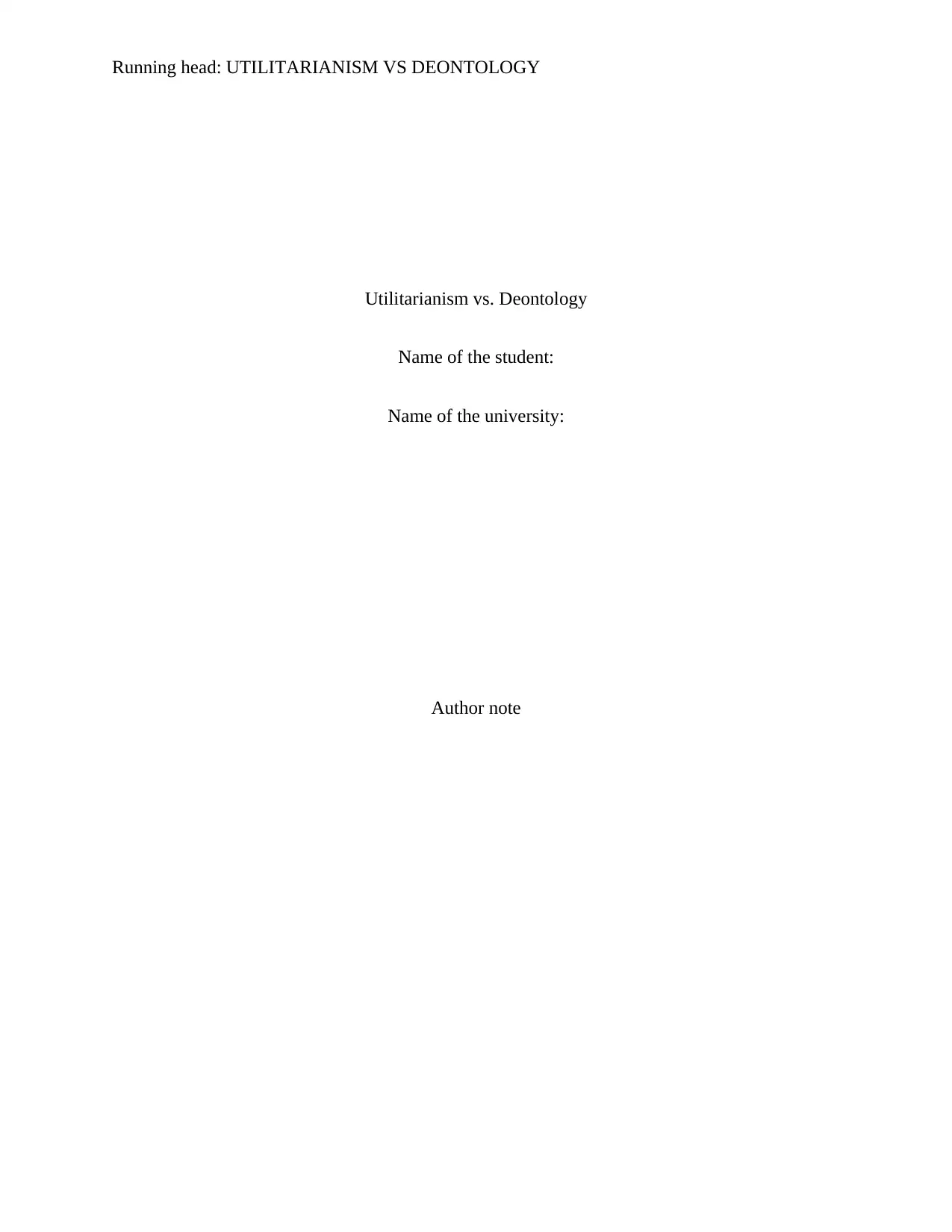
Running head: UTILITARIANISM VS DEONTOLOGY
Utilitarianism vs. Deontology
Name of the student:
Name of the university:
Author note
Utilitarianism vs. Deontology
Name of the student:
Name of the university:
Author note
Secure Best Marks with AI Grader
Need help grading? Try our AI Grader for instant feedback on your assignments.
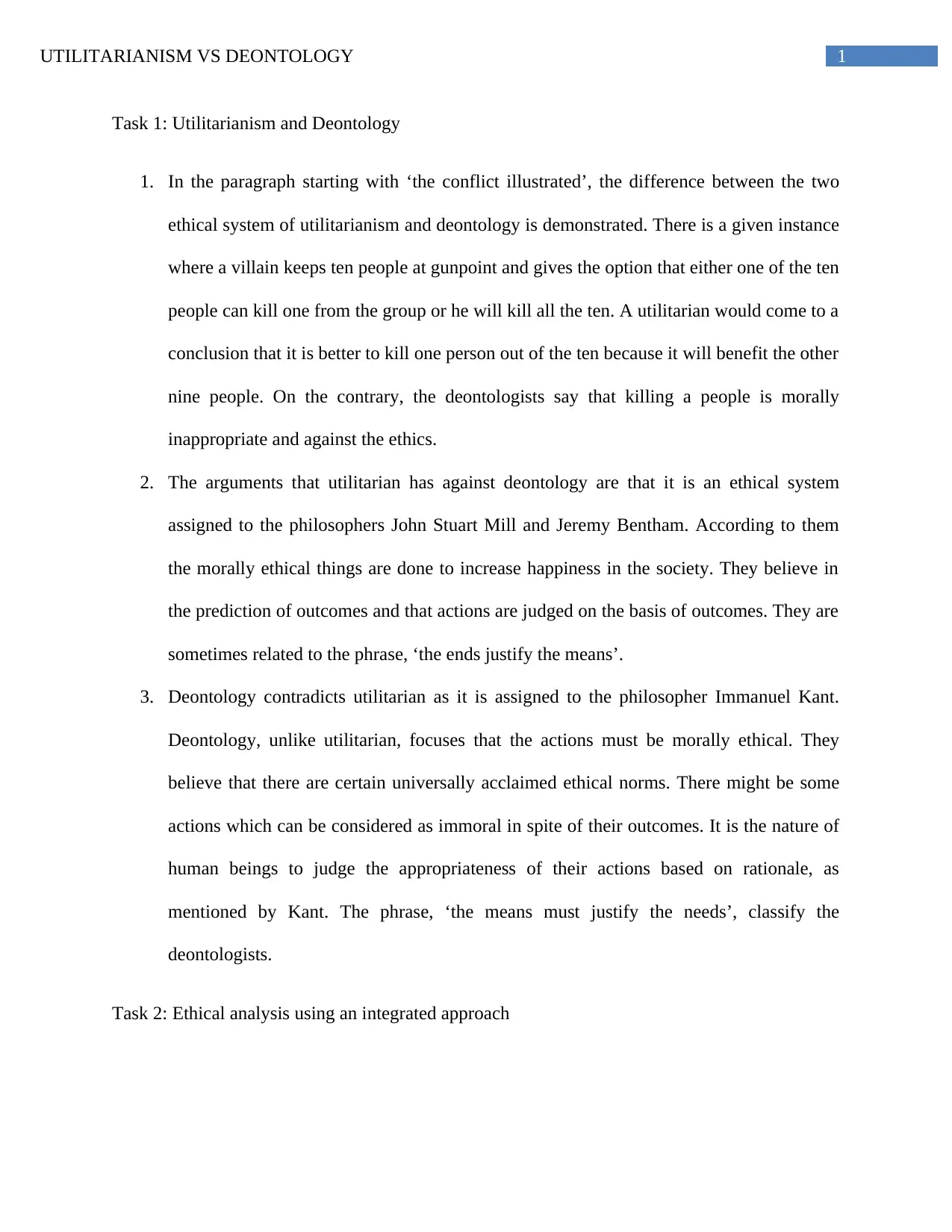
1UTILITARIANISM VS DEONTOLOGY
Task 1: Utilitarianism and Deontology
1. In the paragraph starting with ‘the conflict illustrated’, the difference between the two
ethical system of utilitarianism and deontology is demonstrated. There is a given instance
where a villain keeps ten people at gunpoint and gives the option that either one of the ten
people can kill one from the group or he will kill all the ten. A utilitarian would come to a
conclusion that it is better to kill one person out of the ten because it will benefit the other
nine people. On the contrary, the deontologists say that killing a people is morally
inappropriate and against the ethics.
2. The arguments that utilitarian has against deontology are that it is an ethical system
assigned to the philosophers John Stuart Mill and Jeremy Bentham. According to them
the morally ethical things are done to increase happiness in the society. They believe in
the prediction of outcomes and that actions are judged on the basis of outcomes. They are
sometimes related to the phrase, ‘the ends justify the means’.
3. Deontology contradicts utilitarian as it is assigned to the philosopher Immanuel Kant.
Deontology, unlike utilitarian, focuses that the actions must be morally ethical. They
believe that there are certain universally acclaimed ethical norms. There might be some
actions which can be considered as immoral in spite of their outcomes. It is the nature of
human beings to judge the appropriateness of their actions based on rationale, as
mentioned by Kant. The phrase, ‘the means must justify the needs’, classify the
deontologists.
Task 2: Ethical analysis using an integrated approach
Task 1: Utilitarianism and Deontology
1. In the paragraph starting with ‘the conflict illustrated’, the difference between the two
ethical system of utilitarianism and deontology is demonstrated. There is a given instance
where a villain keeps ten people at gunpoint and gives the option that either one of the ten
people can kill one from the group or he will kill all the ten. A utilitarian would come to a
conclusion that it is better to kill one person out of the ten because it will benefit the other
nine people. On the contrary, the deontologists say that killing a people is morally
inappropriate and against the ethics.
2. The arguments that utilitarian has against deontology are that it is an ethical system
assigned to the philosophers John Stuart Mill and Jeremy Bentham. According to them
the morally ethical things are done to increase happiness in the society. They believe in
the prediction of outcomes and that actions are judged on the basis of outcomes. They are
sometimes related to the phrase, ‘the ends justify the means’.
3. Deontology contradicts utilitarian as it is assigned to the philosopher Immanuel Kant.
Deontology, unlike utilitarian, focuses that the actions must be morally ethical. They
believe that there are certain universally acclaimed ethical norms. There might be some
actions which can be considered as immoral in spite of their outcomes. It is the nature of
human beings to judge the appropriateness of their actions based on rationale, as
mentioned by Kant. The phrase, ‘the means must justify the needs’, classify the
deontologists.
Task 2: Ethical analysis using an integrated approach
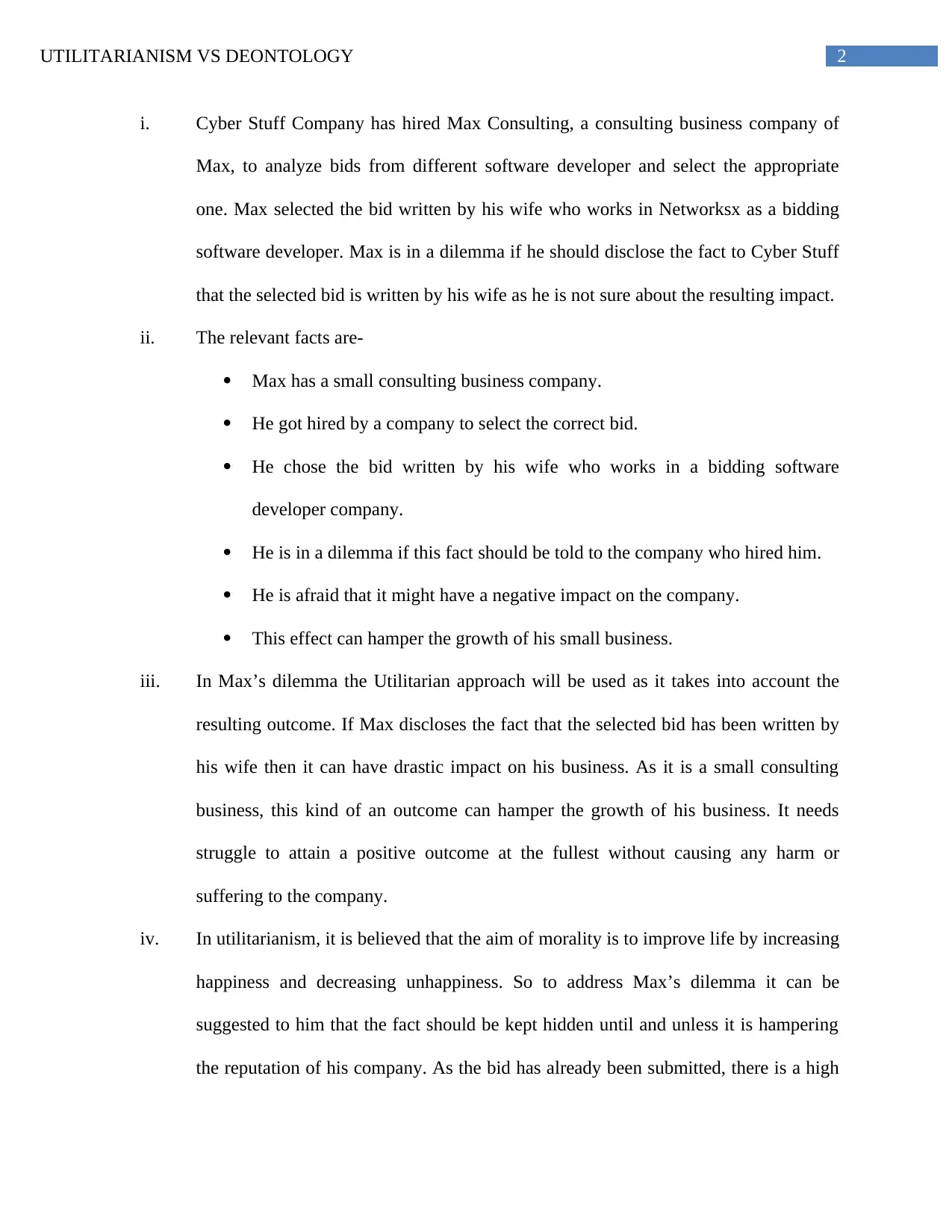
2UTILITARIANISM VS DEONTOLOGY
i. Cyber Stuff Company has hired Max Consulting, a consulting business company of
Max, to analyze bids from different software developer and select the appropriate
one. Max selected the bid written by his wife who works in Networksx as a bidding
software developer. Max is in a dilemma if he should disclose the fact to Cyber Stuff
that the selected bid is written by his wife as he is not sure about the resulting impact.
ii. The relevant facts are-
Max has a small consulting business company.
He got hired by a company to select the correct bid.
He chose the bid written by his wife who works in a bidding software
developer company.
He is in a dilemma if this fact should be told to the company who hired him.
He is afraid that it might have a negative impact on the company.
This effect can hamper the growth of his small business.
iii. In Max’s dilemma the Utilitarian approach will be used as it takes into account the
resulting outcome. If Max discloses the fact that the selected bid has been written by
his wife then it can have drastic impact on his business. As it is a small consulting
business, this kind of an outcome can hamper the growth of his business. It needs
struggle to attain a positive outcome at the fullest without causing any harm or
suffering to the company.
iv. In utilitarianism, it is believed that the aim of morality is to improve life by increasing
happiness and decreasing unhappiness. So to address Max’s dilemma it can be
suggested to him that the fact should be kept hidden until and unless it is hampering
the reputation of his company. As the bid has already been submitted, there is a high
i. Cyber Stuff Company has hired Max Consulting, a consulting business company of
Max, to analyze bids from different software developer and select the appropriate
one. Max selected the bid written by his wife who works in Networksx as a bidding
software developer. Max is in a dilemma if he should disclose the fact to Cyber Stuff
that the selected bid is written by his wife as he is not sure about the resulting impact.
ii. The relevant facts are-
Max has a small consulting business company.
He got hired by a company to select the correct bid.
He chose the bid written by his wife who works in a bidding software
developer company.
He is in a dilemma if this fact should be told to the company who hired him.
He is afraid that it might have a negative impact on the company.
This effect can hamper the growth of his small business.
iii. In Max’s dilemma the Utilitarian approach will be used as it takes into account the
resulting outcome. If Max discloses the fact that the selected bid has been written by
his wife then it can have drastic impact on his business. As it is a small consulting
business, this kind of an outcome can hamper the growth of his business. It needs
struggle to attain a positive outcome at the fullest without causing any harm or
suffering to the company.
iv. In utilitarianism, it is believed that the aim of morality is to improve life by increasing
happiness and decreasing unhappiness. So to address Max’s dilemma it can be
suggested to him that the fact should be kept hidden until and unless it is hampering
the reputation of his company. As the bid has already been submitted, there is a high
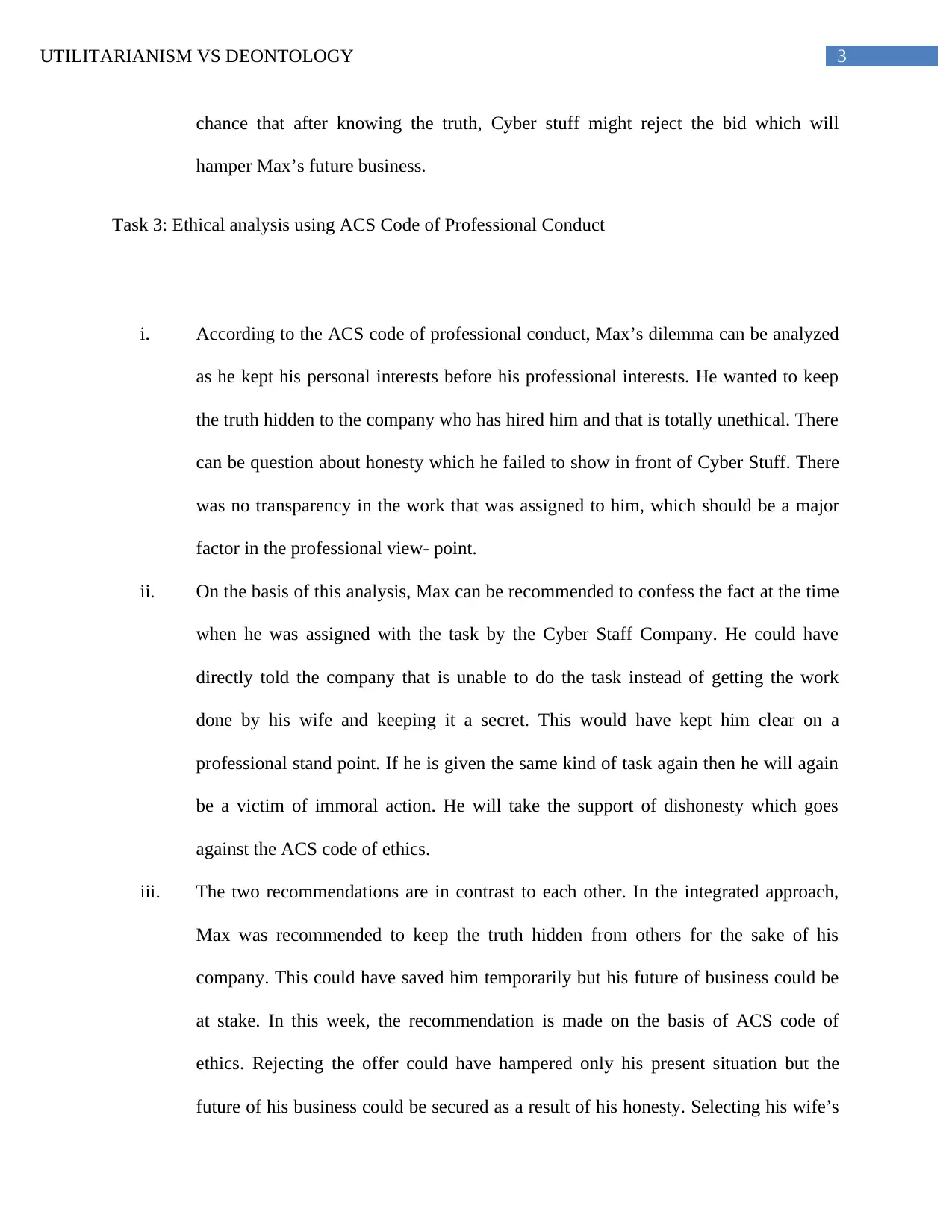
3UTILITARIANISM VS DEONTOLOGY
chance that after knowing the truth, Cyber stuff might reject the bid which will
hamper Max’s future business.
Task 3: Ethical analysis using ACS Code of Professional Conduct
i. According to the ACS code of professional conduct, Max’s dilemma can be analyzed
as he kept his personal interests before his professional interests. He wanted to keep
the truth hidden to the company who has hired him and that is totally unethical. There
can be question about honesty which he failed to show in front of Cyber Stuff. There
was no transparency in the work that was assigned to him, which should be a major
factor in the professional view- point.
ii. On the basis of this analysis, Max can be recommended to confess the fact at the time
when he was assigned with the task by the Cyber Staff Company. He could have
directly told the company that is unable to do the task instead of getting the work
done by his wife and keeping it a secret. This would have kept him clear on a
professional stand point. If he is given the same kind of task again then he will again
be a victim of immoral action. He will take the support of dishonesty which goes
against the ACS code of ethics.
iii. The two recommendations are in contrast to each other. In the integrated approach,
Max was recommended to keep the truth hidden from others for the sake of his
company. This could have saved him temporarily but his future of business could be
at stake. In this week, the recommendation is made on the basis of ACS code of
ethics. Rejecting the offer could have hampered only his present situation but the
future of his business could be secured as a result of his honesty. Selecting his wife’s
chance that after knowing the truth, Cyber stuff might reject the bid which will
hamper Max’s future business.
Task 3: Ethical analysis using ACS Code of Professional Conduct
i. According to the ACS code of professional conduct, Max’s dilemma can be analyzed
as he kept his personal interests before his professional interests. He wanted to keep
the truth hidden to the company who has hired him and that is totally unethical. There
can be question about honesty which he failed to show in front of Cyber Stuff. There
was no transparency in the work that was assigned to him, which should be a major
factor in the professional view- point.
ii. On the basis of this analysis, Max can be recommended to confess the fact at the time
when he was assigned with the task by the Cyber Staff Company. He could have
directly told the company that is unable to do the task instead of getting the work
done by his wife and keeping it a secret. This would have kept him clear on a
professional stand point. If he is given the same kind of task again then he will again
be a victim of immoral action. He will take the support of dishonesty which goes
against the ACS code of ethics.
iii. The two recommendations are in contrast to each other. In the integrated approach,
Max was recommended to keep the truth hidden from others for the sake of his
company. This could have saved him temporarily but his future of business could be
at stake. In this week, the recommendation is made on the basis of ACS code of
ethics. Rejecting the offer could have hampered only his present situation but the
future of his business could be secured as a result of his honesty. Selecting his wife’s
Secure Best Marks with AI Grader
Need help grading? Try our AI Grader for instant feedback on your assignments.
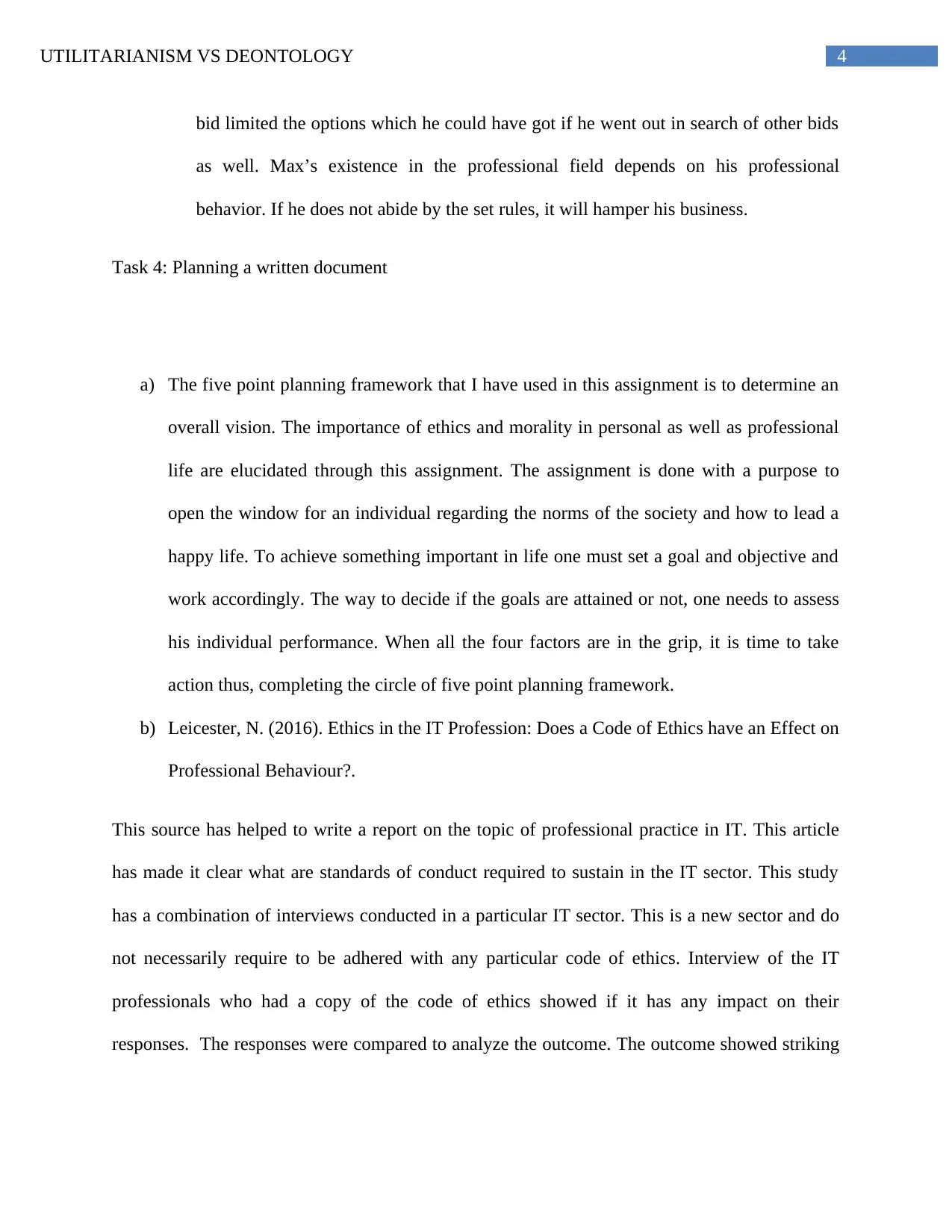
4UTILITARIANISM VS DEONTOLOGY
bid limited the options which he could have got if he went out in search of other bids
as well. Max’s existence in the professional field depends on his professional
behavior. If he does not abide by the set rules, it will hamper his business.
Task 4: Planning a written document
a) The five point planning framework that I have used in this assignment is to determine an
overall vision. The importance of ethics and morality in personal as well as professional
life are elucidated through this assignment. The assignment is done with a purpose to
open the window for an individual regarding the norms of the society and how to lead a
happy life. To achieve something important in life one must set a goal and objective and
work accordingly. The way to decide if the goals are attained or not, one needs to assess
his individual performance. When all the four factors are in the grip, it is time to take
action thus, completing the circle of five point planning framework.
b) Leicester, N. (2016). Ethics in the IT Profession: Does a Code of Ethics have an Effect on
Professional Behaviour?.
This source has helped to write a report on the topic of professional practice in IT. This article
has made it clear what are standards of conduct required to sustain in the IT sector. This study
has a combination of interviews conducted in a particular IT sector. This is a new sector and do
not necessarily require to be adhered with any particular code of ethics. Interview of the IT
professionals who had a copy of the code of ethics showed if it has any impact on their
responses. The responses were compared to analyze the outcome. The outcome showed striking
bid limited the options which he could have got if he went out in search of other bids
as well. Max’s existence in the professional field depends on his professional
behavior. If he does not abide by the set rules, it will hamper his business.
Task 4: Planning a written document
a) The five point planning framework that I have used in this assignment is to determine an
overall vision. The importance of ethics and morality in personal as well as professional
life are elucidated through this assignment. The assignment is done with a purpose to
open the window for an individual regarding the norms of the society and how to lead a
happy life. To achieve something important in life one must set a goal and objective and
work accordingly. The way to decide if the goals are attained or not, one needs to assess
his individual performance. When all the four factors are in the grip, it is time to take
action thus, completing the circle of five point planning framework.
b) Leicester, N. (2016). Ethics in the IT Profession: Does a Code of Ethics have an Effect on
Professional Behaviour?.
This source has helped to write a report on the topic of professional practice in IT. This article
has made it clear what are standards of conduct required to sustain in the IT sector. This study
has a combination of interviews conducted in a particular IT sector. This is a new sector and do
not necessarily require to be adhered with any particular code of ethics. Interview of the IT
professionals who had a copy of the code of ethics showed if it has any impact on their
responses. The responses were compared to analyze the outcome. The outcome showed striking
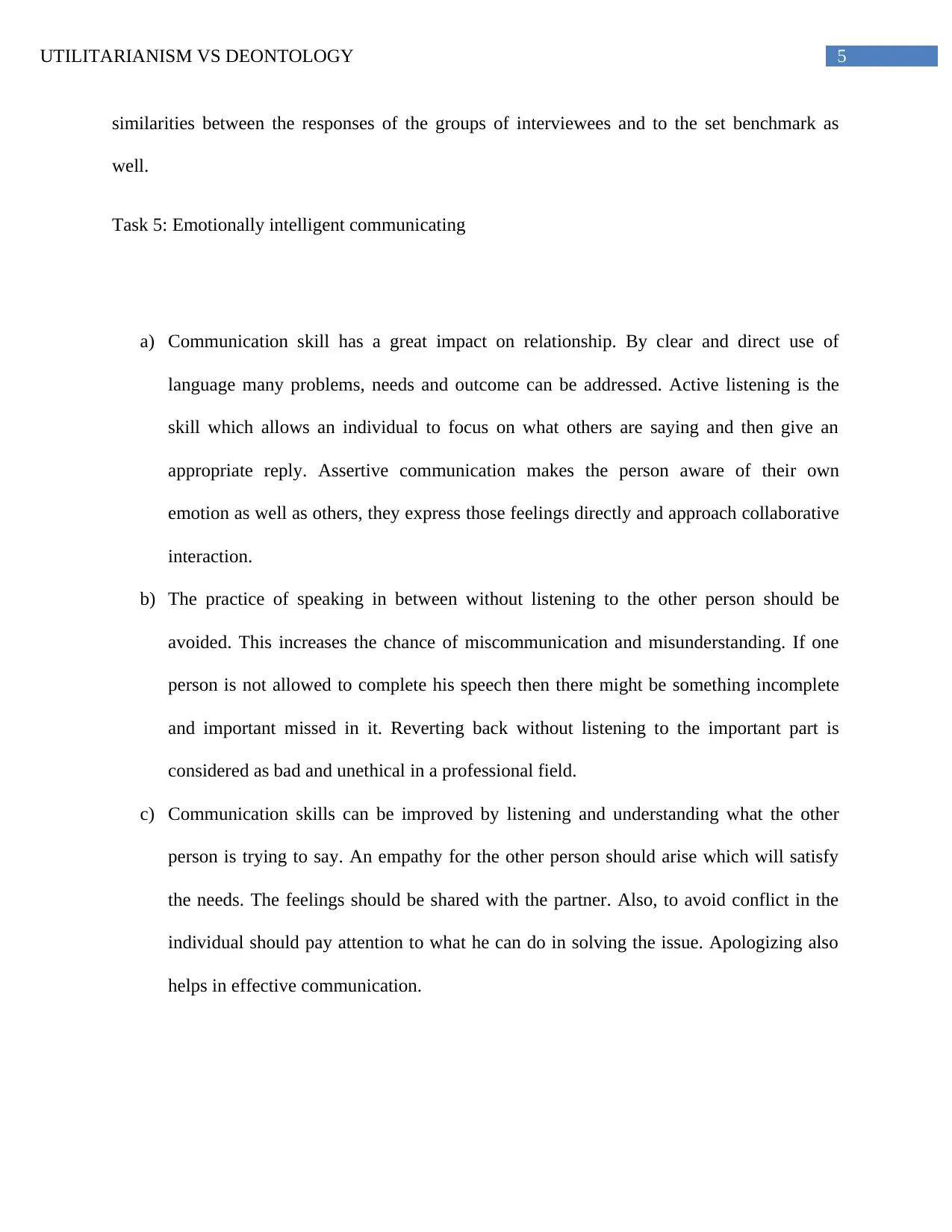
5UTILITARIANISM VS DEONTOLOGY
similarities between the responses of the groups of interviewees and to the set benchmark as
well.
Task 5: Emotionally intelligent communicating
a) Communication skill has a great impact on relationship. By clear and direct use of
language many problems, needs and outcome can be addressed. Active listening is the
skill which allows an individual to focus on what others are saying and then give an
appropriate reply. Assertive communication makes the person aware of their own
emotion as well as others, they express those feelings directly and approach collaborative
interaction.
b) The practice of speaking in between without listening to the other person should be
avoided. This increases the chance of miscommunication and misunderstanding. If one
person is not allowed to complete his speech then there might be something incomplete
and important missed in it. Reverting back without listening to the important part is
considered as bad and unethical in a professional field.
c) Communication skills can be improved by listening and understanding what the other
person is trying to say. An empathy for the other person should arise which will satisfy
the needs. The feelings should be shared with the partner. Also, to avoid conflict in the
individual should pay attention to what he can do in solving the issue. Apologizing also
helps in effective communication.
similarities between the responses of the groups of interviewees and to the set benchmark as
well.
Task 5: Emotionally intelligent communicating
a) Communication skill has a great impact on relationship. By clear and direct use of
language many problems, needs and outcome can be addressed. Active listening is the
skill which allows an individual to focus on what others are saying and then give an
appropriate reply. Assertive communication makes the person aware of their own
emotion as well as others, they express those feelings directly and approach collaborative
interaction.
b) The practice of speaking in between without listening to the other person should be
avoided. This increases the chance of miscommunication and misunderstanding. If one
person is not allowed to complete his speech then there might be something incomplete
and important missed in it. Reverting back without listening to the important part is
considered as bad and unethical in a professional field.
c) Communication skills can be improved by listening and understanding what the other
person is trying to say. An empathy for the other person should arise which will satisfy
the needs. The feelings should be shared with the partner. Also, to avoid conflict in the
individual should pay attention to what he can do in solving the issue. Apologizing also
helps in effective communication.
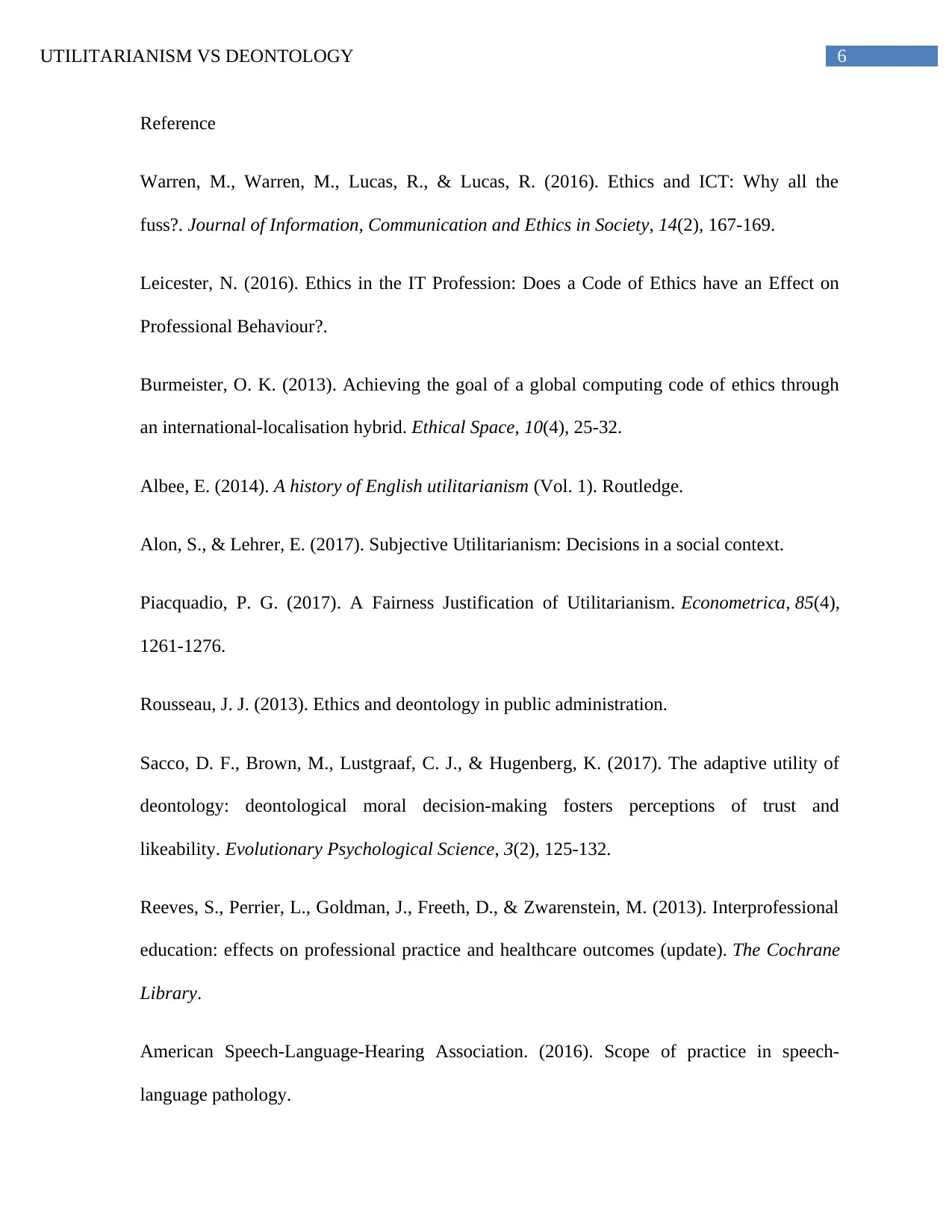
6UTILITARIANISM VS DEONTOLOGY
Reference
Warren, M., Warren, M., Lucas, R., & Lucas, R. (2016). Ethics and ICT: Why all the
fuss?. Journal of Information, Communication and Ethics in Society, 14(2), 167-169.
Leicester, N. (2016). Ethics in the IT Profession: Does a Code of Ethics have an Effect on
Professional Behaviour?.
Burmeister, O. K. (2013). Achieving the goal of a global computing code of ethics through
an international-localisation hybrid. Ethical Space, 10(4), 25-32.
Albee, E. (2014). A history of English utilitarianism (Vol. 1). Routledge.
Alon, S., & Lehrer, E. (2017). Subjective Utilitarianism: Decisions in a social context.
Piacquadio, P. G. (2017). A Fairness Justification of Utilitarianism. Econometrica, 85(4),
1261-1276.
Rousseau, J. J. (2013). Ethics and deontology in public administration.
Sacco, D. F., Brown, M., Lustgraaf, C. J., & Hugenberg, K. (2017). The adaptive utility of
deontology: deontological moral decision-making fosters perceptions of trust and
likeability. Evolutionary Psychological Science, 3(2), 125-132.
Reeves, S., Perrier, L., Goldman, J., Freeth, D., & Zwarenstein, M. (2013). Interprofessional
education: effects on professional practice and healthcare outcomes (update). The Cochrane
Library.
American Speech-Language-Hearing Association. (2016). Scope of practice in speech-
language pathology.
Reference
Warren, M., Warren, M., Lucas, R., & Lucas, R. (2016). Ethics and ICT: Why all the
fuss?. Journal of Information, Communication and Ethics in Society, 14(2), 167-169.
Leicester, N. (2016). Ethics in the IT Profession: Does a Code of Ethics have an Effect on
Professional Behaviour?.
Burmeister, O. K. (2013). Achieving the goal of a global computing code of ethics through
an international-localisation hybrid. Ethical Space, 10(4), 25-32.
Albee, E. (2014). A history of English utilitarianism (Vol. 1). Routledge.
Alon, S., & Lehrer, E. (2017). Subjective Utilitarianism: Decisions in a social context.
Piacquadio, P. G. (2017). A Fairness Justification of Utilitarianism. Econometrica, 85(4),
1261-1276.
Rousseau, J. J. (2013). Ethics and deontology in public administration.
Sacco, D. F., Brown, M., Lustgraaf, C. J., & Hugenberg, K. (2017). The adaptive utility of
deontology: deontological moral decision-making fosters perceptions of trust and
likeability. Evolutionary Psychological Science, 3(2), 125-132.
Reeves, S., Perrier, L., Goldman, J., Freeth, D., & Zwarenstein, M. (2013). Interprofessional
education: effects on professional practice and healthcare outcomes (update). The Cochrane
Library.
American Speech-Language-Hearing Association. (2016). Scope of practice in speech-
language pathology.
1 out of 7
Your All-in-One AI-Powered Toolkit for Academic Success.
+13062052269
info@desklib.com
Available 24*7 on WhatsApp / Email
![[object Object]](/_next/static/media/star-bottom.7253800d.svg)
Unlock your academic potential
© 2024 | Zucol Services PVT LTD | All rights reserved.